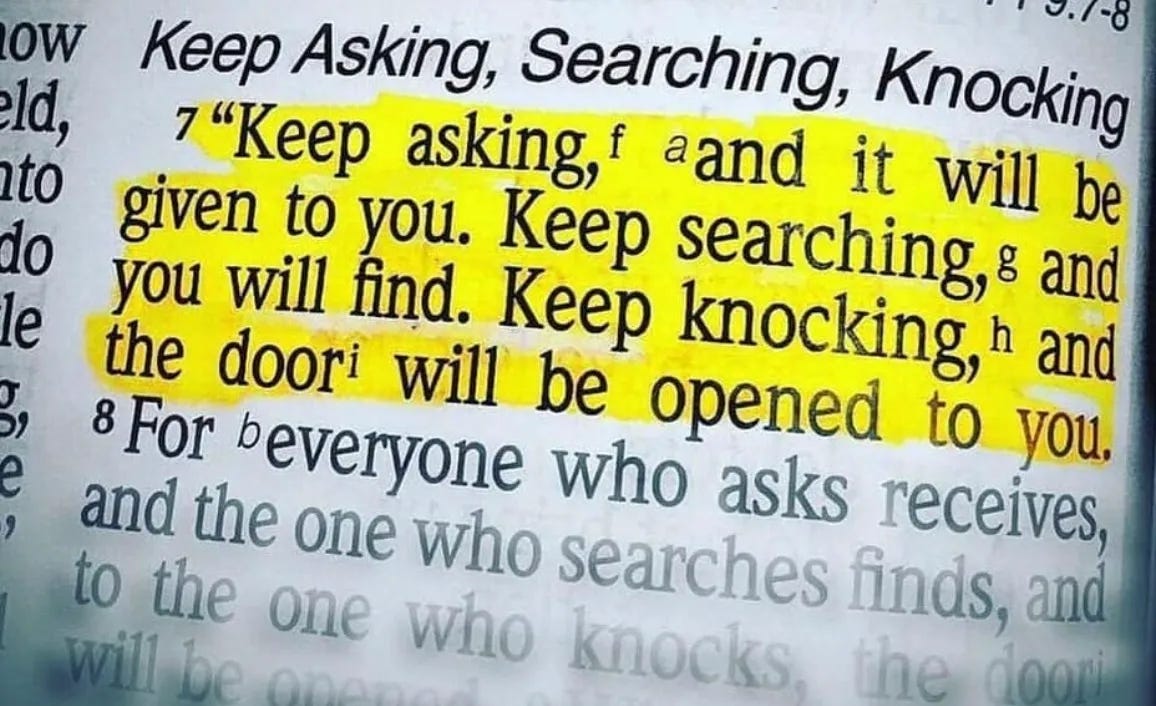(Warning: You may not like the best answer!)
If you’re struggling to decide whether or not to agree to an engagement that doesn’t pay enough, far more often than we’d like, the answer is probably going to be “No.” And sometimes, if it’s not “No,” it just might be in your best interest to say, “HELL NO!!!”
Speaking from experience, I failed to say “No” enough, and I spent way too much of my prime years trying to hurry up and get another role on the resume ASAP for the sake of getting another role on the resume ASAP. It was never enough income and often not what I really wanted to do either. I went down a perilous financial path trying to “keep up” or “stay current” and do all the “right” things in my singing career.
In my previous post, I identified some of the biggest contributing factors as to why so many highly educated and highly accomplished artists are susceptible to a financially perilous life and career. And to put the “starving” in “starving artist,” I made an acronym out of these eight largest factors contributing to the widespread practice of insufficient pay:
Superiority Complexes (Too good for money, purity, etc.)
Tradition (Like the patriarchal or religious traditions or the “We don’t pay because we’re just a non-profit!” kinds of traditions.)
After Hours (Pay is optional because it’s just a hobby or you’re supposed to have a day job.)
Really bad with money (Personal apathy, organization mismanagement, etc.)
Villains or very bad people (Wage thieves, abusers, exploiting career dreams, etc.)
Ignorant people (People who just don’t know!)
Nurturers (Codependent tendencies.)
G.U.N.K. in your head (Generational beliefs, Unhealed core wounds, Negative thinking, and other Knowledge that doesn’t serve you).
The inconvenient truth is we’re not going to magically change everyone and how they conduct their artistic or business operations on a dime. We’re not going suddenly go from optional wages like it’s still 1954 to livable wages appropriate for 2024.
We have to be very deliberative and conscientious in deciding if and when an opportunity that will likely not pay enough is nonetheless worth considering anyway. As I said in the previous post, one major lesson I’ve learned the hard way in my career as a teacher and performer is there is no guarantee of reciprocity for free and underpaid work.
You almost have to be open to treating some engagements like you’re loaning an equivalent amount of money to a family member or a friend who won’t ever be able to pay you back. Speaking of friends, one common gig decision formula I’ve seen different variations of on social media is that the gig must include at least two of the following “good” attributes: good friends, good fun, and good money. What do you think?

Four Questions to Make a Decision
Going with the flow of what our friends may or may not want is often not best for our long-term business and career success. Here are four questions I learned from one of my mentors that can really help bring clarity to the mind regarding a decision on the way to your next goal. You want to make sure it’s something you really want, make sure it’s going to get you something even bigger you want down the road, and make sure there won’t be unintended consequences.
This an important process to go through with a big decision, especially if you’re trying to determine whether to take part in a “sunk cost” or a “loss leader” activity for your business or career. Of the following questions, only move onto the next question if the answer is YES!
1. Is this something I really want to be, do, or have in my life?
2. Is this going to take me closer to my goal?
3. Is this in harmony with God's laws, the laws of the universe, and/or the laws of nature? Or does this align with my highest values and/or otherwise contribute to an increase or betterment of life?
4. Will others not be harmed, and/or will they still retain their right to make a different choice?
If any of the answers are "No," then you likely have the best answer regarding the gig.
As to the last question, take time to really think about how the lost income, the time commitment, or at least the lack of any immediate return on the investment may potentially affect your relationships; be sure to consider your family, friends and others who may depend on you.
And even if you can “afford” to do the gig(s) at the moment, seriously consider if you could afford to withstand any emergencies during the gig, or any repercussions down the road if some other kind of an event came up in your life. In other words, could you have a reason to regret not using the time to earn more income elsewhere? I’m not here to judge your answers, but be brutally honest with yourself with this. And remember there’s always going to be another opportunity further down the road.
How much should you really be earning?
I believe there should be a minimum standard livable wage for artistic engagements. In our economic system, paying everyone enough to actually afford to live and thrive is arguably one of the most equitable and inclusive ways to operate with integrity. Many would rather hoard their wealth and disagree. But we still have the power to choose to hold ourselves and how we earn to a higher standard anyway.
So if you could give yourself a salary that actually more than covers all your needs so you could live a happy, healthy, and comfortable quality of life, how much would that be? Start by calculating the costs of all your bills and expenses, including where you’d want to live, what you’d want to drive, and anything else you would want to be do or have in your life. Stay within a reasonable range, but don’t be afraid to give yourself permission to actually want what you really want!
Now let’s take that number and see what the hourly wage would have to look like if you were operating like most other salaried professionals working 40 hours a week for 50 weeks out of a year. (We’re giving ourselves a built-in two-week vacation and keep the math simple!). That would amount to 2,000 working hours in a given year. So take the total salary from the previous paragraph and divide it by 2,000 hours to determine the average wage it would take to sustain the life you want.
Let’s say you need around $100,000 to live in the center of a major city, but maybe you’ll want a little more than that, so let’s use $120,000 as an example. If you take $120,000 and divide it by 2,000, you’ll get an hourly rate of $60. If you were to treat your artistic career like any other full-time job working 40 hours a week, and you had no other income, the average wage for your engagements would need to be $60 per hour to keep you on track to that financial goal.

But NO ONE wants to pay that much!
Yes. That’s probably true! Many opportunities will likely not want to offer to pay anywhere close to the wage you would actually need to live the life you want. So a key part of the decision making process for whether or not you should take the engagement is to make yourself completely aware of what you’d still need to earn to meet your financial goals. Calculate the total number of hours required to commit; include all rehearsing, practicing, commuting and other related time commitments. Then compare the total you’d need to earn to meet your financial goal with the total they are offering to pay.
As an example, let’s say you have a soloist opportunity with a local orchestra and choir. The honorarium they are offering to pay you is $500. In addition to the performance requiring at least 4 hours of your day (and likely inhibiting you from other work that day), you have at least 10 hours of scheduled rehearsing in the preceding week. You also have a 30-minute commute each way to the venue, plus you have to pay for gas and parking. You also have to find time to practice on your own, and maybe even pay to work with a coach. So that’s already at least 16 hours of committed time. Based upon your bottom line hourly rate of $60, you would need to be paid at least $960 plus expenses. Only getting paid $500 means you have to decide if the opportunity is worth only getting roughly half (and after taxes, it’s even less than half!) of what you’d need.
(Now imagine doing this math for a multi-month opera or musical production! 😶)
As you decide whether or not to take on the engagement that doesn’t pay enough, before you read onward, DID YOU EVEN TRY AND ASK FOR MORE? As I mentioned in the previous post, more people than we might think have no idea what’s appropriate to pay today. Even an old-school gatekeeper might need a lesson in the new school market rates! Give yourself permission to at least ask—and with gratitude!

Can you make up the “lost income” elsewhere?
If you’re going to successfully meet your financial goals, you’ll have to consider how else you can generate the additional income to make up the difference. First, determine if the hypothetical “lost income” you’re not receiving will become its own return on investment sooner rather than later. Would this opportunity open a new door to a better opportunity that’ll pay off soon afterward?
If you would need additional income to survive or stay on track toward your financial goals while doing the gig, consider the following questions:
Can you afford to take on extra work or carry out other jobs in any other capacity during your off time?
Could you take on a new student or client if you offer any other professional services?
Could you offer a new product or service to your current clients or audience?
If you have a Patreon, Substack, or a similar account, could you gain additional subscribers or create more content for existing subscribers who contribute more?
Could you do your own additional engagements adjacent to the gig? (e.g. a recital, masterclass, or small performance elsewhere in town around the gig date.)
Is there anyone else you could have any other kind of reason to ask for any money or other support towards the gig?

Could you be of further service to the organization?
If they outright don’t want to pay you enough, it never hurts to ask them if you could be of greater service to them in exchange for additional income and/or benefits.
Could you offer more of your artistry?
Work out a package deal with additional engagements
Perform at outreach and promotional events
Donor functions (at least get a chance to schmooze!)
Offer to teach or speak or do other performing on their behalf
Could you offer to assist in other duties for the organization?
Fundraising, promotions, etc.
Your transferable professional skills
Other ways you can help
Offer other ideas to generate revenue

How else could they reciprocate?
Here are some ideas for non-monetary compensation you could consider asking for, some of which could actually be much more valuable than a bigger paycheck. Most of these ideas won’t work for every situation, but if it’s a large enough organization, if there are the right kinds of donors, or if the right influential people are in charge, there might be more possibilities than you might otherwise believe. Consider these possibilities for what you could request:
Transportation, lodging and meals (or upgrades, etc.)
Comp tickets, passes and other perks
Scheduling considerations, flexibility, and/or excused absences
Programming considerations (you get more solos, repertoire choices, etc.)
Video/audio recordings, photographs and rights thereto
Access to organizational facilities and other resources
Space to Practice, Record or Teach
Library Access
Other goods and services from organizational stakeholders, sponsors, or donors
Medical, dental, legal, financial, fitness, etc.
Education/professional development offerings
Lessons, coachings, courses, seminars, etc.
Scholarships, tuition remission, fee waivers, etc.
Any other experiences or products the organization or their sponsors ordinarily offer that are of value to you
Advertising, promotions, sales, etc.
Referrals & Testimonials
If you have any other ideas, please share them below in the comments! Some may require more explaining than others, and much will depend on whether it’s a tiny “store front” company, a church, a festival, an educational institution, or a large corporation. As long as you are serving them and providing them value that is greater than the value of the money or anything else you’re receiving, you’ll have no reason to feel like you’re out of integrity.
When in doubt, ASK! It never hurts. Be kind, be humble, stay in a state of gratitude, and just ASK. If you can demonstrate that there is an opportunity for them to be of value in return to you without having to pay more money, they just might be happy to see how they can accommodate your needs—OR they might just happily shell out the additional money instead!
Finally, when you get a response, be sure to go back through the four questions one more time and make sure you answer “Yes” to all four before you officially tell them “Yes!”
I hope this helps!
If you need help and support in your business or career, send me a message.
(Otherwise, check out the list below for other options you can trust):








Great article with solid actions for all working musicians. Also, notice how low-ball jobs and freebies end up being the biggest headache with more and more demands, as if "yes, I'll help you out" is interpreted as carte blanche. Another peeve is when orgs cite their budget to justify the low-ball, as if individuals don't also have budgets. Thanks for the great content.